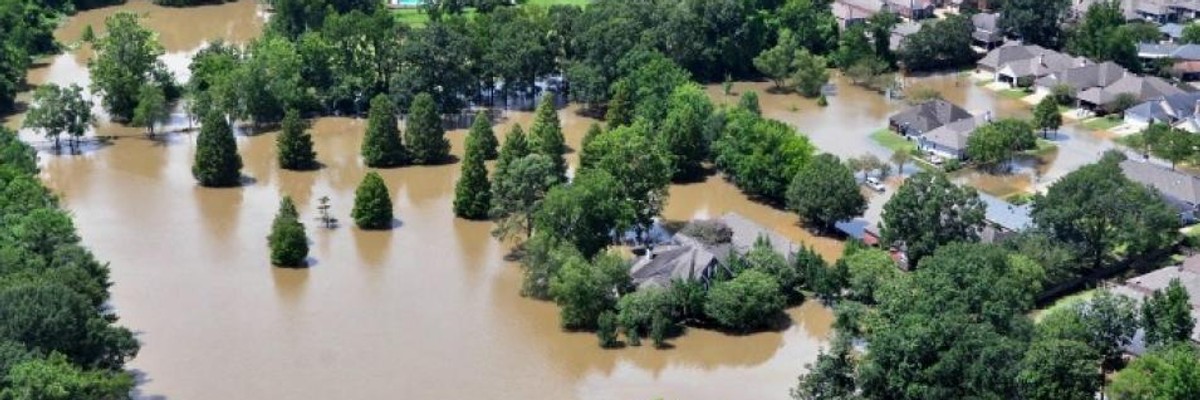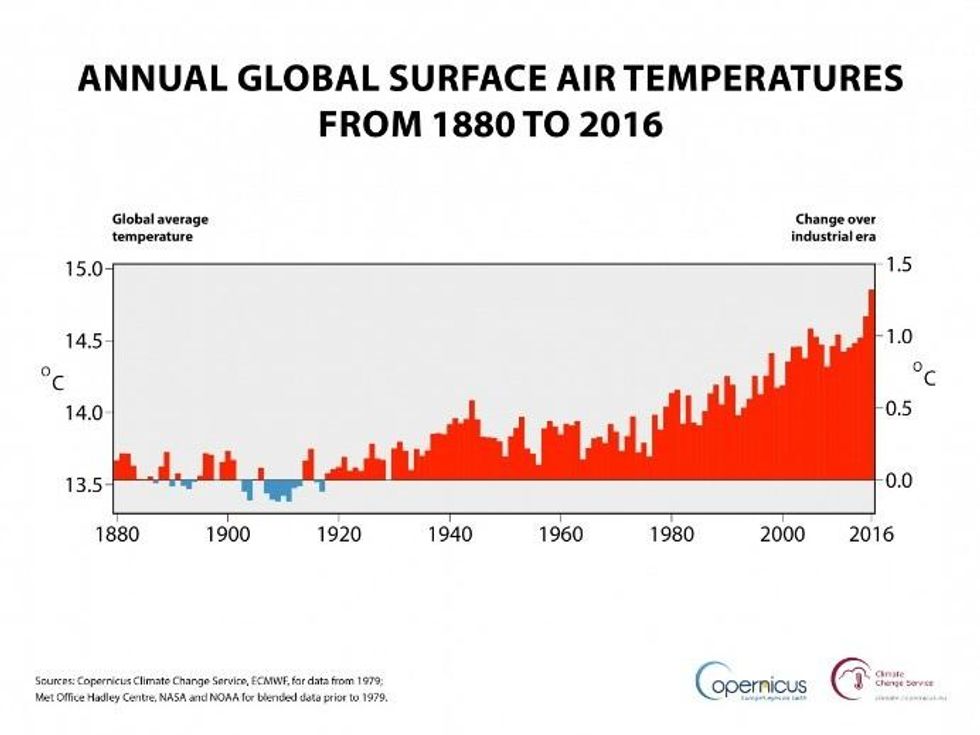

SUBSCRIBE TO OUR FREE NEWSLETTER
Daily news & progressive opinion—funded by the people, not the corporations—delivered straight to your inbox.
5
#000000
#FFFFFF
To donate by check, phone, or other method, see our More Ways to Give page.


Daily news & progressive opinion—funded by the people, not the corporations—delivered straight to your inbox.

An aerial photo shows severe flooding in a residential area of Baton Rouge, La. on Aug. 15, 2016. (Photo: U.S. Coast Guard)
Earth is "on the edge."
So declared the EU's Copernicus Climate Change Service (C3S) Thursday, announcing that 2016 was the warmest year on record.
The first global assessment of last year's temperatures finds that 2016 broke the record set in 2015 by close to 0.2degC , with last year's record having broken the record set in 2014.
According to meteorologist Jeff Masters, who is not part of the C3S: "The 3-year string of warmest years on record is the first time such an event has happened since record keeping began in 1880."
"We are already seeing around the globe the impacts of a changing climate," Copernicus's Juan Garces de Marcilla. "Land and sea temperatures are rising along with sea-levels, while the world's sea-ice extent, glacier volume, and snow cover are decreasing; rainfall patterns are changing and climate-related extremes such as heatwaves, floods and droughts are increasing in frequency and intensity for many regions."

The peak for global temperatures occurred in February, when they were around 1.5degC higher than at the start of the Industrial Revolution--the global warming cap goal global nations agreed to in the Paris climate deal negotiated at the end of 2015.
Yet, as Masters, noted, "[a]ssuming that all nations who agreed to the Paris Climate Accord in 2015 fulfill their pledges, Earth is on track to see 2.3degC of warming over pre-industrial levels by 2050. This is above the 'dangerous' 2degC level of warming considered likely to greatly increase the risk of hunger, thirst, disease, refugees, and war."
The incoming U.S. administration, however has given signs that it will go full-speed ahead at driving further climate change. Among other things, Donald Trump has chosen climate change skeptic and "fossil fuel industry puppet" Scott Pruitt to head the EPA, while the president-elect himself falsely declared last month that "nobody really knows" if climate change is real, and has also threatened to cancel the Paris climate deal.
Taking that action, said noted climate scientist Ben Santer of the Lawrence Livermore National Lab in California, would be like "embracing ignorance with open arms."
Germany-based insurance group Munich Re, meanwhile, announced Wednesday that 2016 was also particularly disastrous.
"A number of devastating earthquakes and powerful storms made 2016 the costliest twelve months for natural catastrophe losses in the last four years," it said in a statement.
At over $31 billion USD, the costliest disaster of the 750 events was a pair of earthquakes that hit the Japanese island of Kyushu in April; the costliest to hit North America was Hurricane Matthew, and the flooding in August in the southern United States was also a notably expensive disaster.
"A look at the weather-related catastrophes of 2016 shows the potential effects of unchecked climate change," said Peter Hoppe, Head of Munich Re's geo risks research unit. "Of course, individual events themselves can never be attributed directly to climate change. But there are now many indications that certain events--such as persistent weather systems or storms bringing torrential rain and hail--are more likely to occur in certain regions as a result of climate change."
Political revenge. Mass deportations. Project 2025. Unfathomable corruption. Attacks on Social Security, Medicare, and Medicaid. Pardons for insurrectionists. An all-out assault on democracy. Republicans in Congress are scrambling to give Trump broad new powers to strip the tax-exempt status of any nonprofit he doesn’t like by declaring it a “terrorist-supporting organization.” Trump has already begun filing lawsuits against news outlets that criticize him. At Common Dreams, we won’t back down, but we must get ready for whatever Trump and his thugs throw at us. Our Year-End campaign is our most important fundraiser of the year. As a people-powered nonprofit news outlet, we cover issues the corporate media never will, but we can only continue with our readers’ support. By donating today, please help us fight the dangers of a second Trump presidency. |
Earth is "on the edge."
So declared the EU's Copernicus Climate Change Service (C3S) Thursday, announcing that 2016 was the warmest year on record.
The first global assessment of last year's temperatures finds that 2016 broke the record set in 2015 by close to 0.2degC , with last year's record having broken the record set in 2014.
According to meteorologist Jeff Masters, who is not part of the C3S: "The 3-year string of warmest years on record is the first time such an event has happened since record keeping began in 1880."
"We are already seeing around the globe the impacts of a changing climate," Copernicus's Juan Garces de Marcilla. "Land and sea temperatures are rising along with sea-levels, while the world's sea-ice extent, glacier volume, and snow cover are decreasing; rainfall patterns are changing and climate-related extremes such as heatwaves, floods and droughts are increasing in frequency and intensity for many regions."

The peak for global temperatures occurred in February, when they were around 1.5degC higher than at the start of the Industrial Revolution--the global warming cap goal global nations agreed to in the Paris climate deal negotiated at the end of 2015.
Yet, as Masters, noted, "[a]ssuming that all nations who agreed to the Paris Climate Accord in 2015 fulfill their pledges, Earth is on track to see 2.3degC of warming over pre-industrial levels by 2050. This is above the 'dangerous' 2degC level of warming considered likely to greatly increase the risk of hunger, thirst, disease, refugees, and war."
The incoming U.S. administration, however has given signs that it will go full-speed ahead at driving further climate change. Among other things, Donald Trump has chosen climate change skeptic and "fossil fuel industry puppet" Scott Pruitt to head the EPA, while the president-elect himself falsely declared last month that "nobody really knows" if climate change is real, and has also threatened to cancel the Paris climate deal.
Taking that action, said noted climate scientist Ben Santer of the Lawrence Livermore National Lab in California, would be like "embracing ignorance with open arms."
Germany-based insurance group Munich Re, meanwhile, announced Wednesday that 2016 was also particularly disastrous.
"A number of devastating earthquakes and powerful storms made 2016 the costliest twelve months for natural catastrophe losses in the last four years," it said in a statement.
At over $31 billion USD, the costliest disaster of the 750 events was a pair of earthquakes that hit the Japanese island of Kyushu in April; the costliest to hit North America was Hurricane Matthew, and the flooding in August in the southern United States was also a notably expensive disaster.
"A look at the weather-related catastrophes of 2016 shows the potential effects of unchecked climate change," said Peter Hoppe, Head of Munich Re's geo risks research unit. "Of course, individual events themselves can never be attributed directly to climate change. But there are now many indications that certain events--such as persistent weather systems or storms bringing torrential rain and hail--are more likely to occur in certain regions as a result of climate change."
Earth is "on the edge."
So declared the EU's Copernicus Climate Change Service (C3S) Thursday, announcing that 2016 was the warmest year on record.
The first global assessment of last year's temperatures finds that 2016 broke the record set in 2015 by close to 0.2degC , with last year's record having broken the record set in 2014.
According to meteorologist Jeff Masters, who is not part of the C3S: "The 3-year string of warmest years on record is the first time such an event has happened since record keeping began in 1880."
"We are already seeing around the globe the impacts of a changing climate," Copernicus's Juan Garces de Marcilla. "Land and sea temperatures are rising along with sea-levels, while the world's sea-ice extent, glacier volume, and snow cover are decreasing; rainfall patterns are changing and climate-related extremes such as heatwaves, floods and droughts are increasing in frequency and intensity for many regions."

The peak for global temperatures occurred in February, when they were around 1.5degC higher than at the start of the Industrial Revolution--the global warming cap goal global nations agreed to in the Paris climate deal negotiated at the end of 2015.
Yet, as Masters, noted, "[a]ssuming that all nations who agreed to the Paris Climate Accord in 2015 fulfill their pledges, Earth is on track to see 2.3degC of warming over pre-industrial levels by 2050. This is above the 'dangerous' 2degC level of warming considered likely to greatly increase the risk of hunger, thirst, disease, refugees, and war."
The incoming U.S. administration, however has given signs that it will go full-speed ahead at driving further climate change. Among other things, Donald Trump has chosen climate change skeptic and "fossil fuel industry puppet" Scott Pruitt to head the EPA, while the president-elect himself falsely declared last month that "nobody really knows" if climate change is real, and has also threatened to cancel the Paris climate deal.
Taking that action, said noted climate scientist Ben Santer of the Lawrence Livermore National Lab in California, would be like "embracing ignorance with open arms."
Germany-based insurance group Munich Re, meanwhile, announced Wednesday that 2016 was also particularly disastrous.
"A number of devastating earthquakes and powerful storms made 2016 the costliest twelve months for natural catastrophe losses in the last four years," it said in a statement.
At over $31 billion USD, the costliest disaster of the 750 events was a pair of earthquakes that hit the Japanese island of Kyushu in April; the costliest to hit North America was Hurricane Matthew, and the flooding in August in the southern United States was also a notably expensive disaster.
"A look at the weather-related catastrophes of 2016 shows the potential effects of unchecked climate change," said Peter Hoppe, Head of Munich Re's geo risks research unit. "Of course, individual events themselves can never be attributed directly to climate change. But there are now many indications that certain events--such as persistent weather systems or storms bringing torrential rain and hail--are more likely to occur in certain regions as a result of climate change."